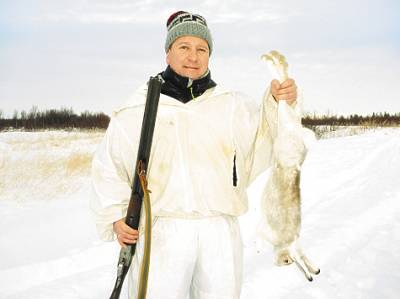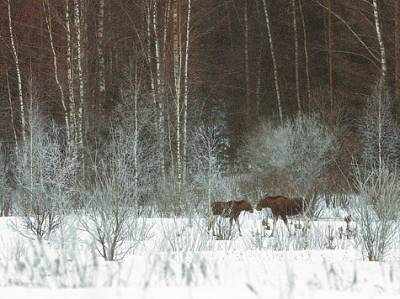
“Unjust laws are not moral obligations” — this is a later interpretation of the words of thinkers of Ancient Rome reflects the state of Affairs in the field of hunting and hunting economy of our country. The need and essence of the law is incomprehensible and alien to the majority of the Russian population, as well as the meaning of freedom, which we have equated with the space between the freemen. But this nation, the heroic and persistent in business, oppressed by the conquerors, and on his own authority, has developed a defense mechanism against any arbitrariness expressed as to the wisdom of folk art, the proverb “not My business, I know nothing” and don’t want to know, and spontaneous reactions — militias, uprisings, revolutions.
Nature and history are not pampered Russian people warm and mild climate, constant and good harvest and a peaceful life, intelligent and a true sovereign, a just social system… their Labor was hard, the results are unpredictable, life is harsh and unpretentious, stay cheerful and monotonous.
Hunting, fishing and gathering is the only natural human right, for many millennia served as a means of meeting its needs for food and clothing, marked the beginning of labour and economic activities of people. Today, hunting has become a expensive way of recreation and leisure for some and an unattainable privilege for others.
Hunting, as an industry, type of activity, it is not the sphere of material production, according to V. K. and V. V. Melnikovs, and the public administration function of government from its comprehensive we power, low level of responsibility for management and high requirements for people. In the USSR it was state owned, cooperative and public hunting, which in modern Russia is transformed into the hunting grounds of the various legal entities.
We cannot agree with the absurd statement V. K. Melnikov, “the basic unit of management in the hunting industry may be the only organization hunting industry — specific economy of any hotpolitics”, which implies a return to the administrative command system of economy.
With our monopoly power, with its exaggerated ideology and the claim to truth and the right of such policies and management have already led to the abandonment of largely sensible socialist ideas, to the collapse of the Soviet state and cooperative hunting and leads to the degradation of the hunt.
Another argument in favor of limiting governmental interference in economic activity is the fact that under the same conditions of transition to a market economy created in the USSR on the initiative of the party, most democratic at the time of the public organization of hunters, where government control was minimal, survived and continue their activities.
Negative the moment of transition from administrative-command system of management to a market economy for hunting is a fact of merging government with business and the infringement of the rights of ordinary hunters, which is confirmed by numerous publications and shows that justice will have to wait a long time.
The reasons lie in the contradictions. You cannot share hunting grounds on public and secured without a clear understanding of clear goals. This division leads to complication of life of the majority, the privilege of a minority, even greater separation of people into rich and poor, difficulties of perception of government policy and its objectives.
Hunting is a social phenomenon, a natural right of a person arising from life itself, its evolution and obeying the laws of nature. But how to understand the word “law”, to understand this concept? To do this tried, are trying and will try many people. Let’s try to figure this out and we, the hunters, by resorting to examples from our daily life and reasoning.
“HORN”, №№ 1-3, 2016. Attracted the attention of three publications: “How to fight poaching” Vladimir Kozlov, “free will” Alexander Kudryashov and “Hunting values” Yuri Konstantinov. Without entering into polemics with the authors (I hope they forgive me for a formal approach to them), I’ll try to explain the difference and what is the commonality of their thoughts and actions.
Article in content and style are different, but they have a lot in common. All hunting is valuable, and they write about what I think is true. Doing all this in their own way, and the truth is everyone has their own, personal, conscious, logical, which in General can be called private truth, or the truth of the citizen.
Yuri in his article for shared values considers the word, the hunt, literature, and denies the value of others.
Alexander, arguing about free will, implies that the freedom of choice (of actions, behavior, thoughts) and protesting against the restriction of that freedom (which is true), at the same time, consciously or not, promotes the interests of producers and sellers of weapons, which is fine.
Vladimir explains the causes of mass violations of hunting regulations that hunters (and they may be people who have not only entered in the register and having a hunting license) be the poachers, not because of “stolen” private or common game, but for the fact that they tried to do and violated the General rules. The poacher and the offender — different concepts, different in meaning, and the name of the article wrong, just like the author’s reasoning that if we are going to regulate not the quantity of extracted game and quantity of hunting effort, it will be more correct.
Common to these three articles is that all the authors are trying to convey to the General reader “your truth”. They turn their thoughts not only to readers, but also to power with the request, approval, belief in the hope that she will hear their private civil the truth. But the government has its own goals and objectives, and represent people who are guided by other rules.
In the accepted Law “About hunting…” there is no explanation of many of the articles and concepts, it makes power and kupongskatten (hunter) on their own, which speaks of the imperfection of the law. Give an example. What is the license and permit, court has clarified, however there is a problem (contradiction) in the conduct of individual and collective hunts. The permit is a contract between a legal person and a hunter. The state as a legal entity, has public lands and for the production of hunting in which subscribes to the permission that is given to the hunter who has paid the fee for the use of wildlife and legal costs, but does not receive a ticket. Another approach to “private” and “public” lands for the production of hunting and requires an agreement. When the collective form of organization of hunting grounds in the assigned state inspectors have started to punish hunters that they have one common resolution, such as the moose, no vouchers from each member of the team. The case was decided only in the regional court, but it may not be reached every rural hunter.
Our legislators, sharing on public lands and secured, preferred (it is not clear from what reasons) to private interests instead of public. Discussing the prospects of hunting and the hunting industry activity in modern society, G. V. Safonov said, very good, but not quite the right idea: “it is Important to consider that in a democracy, even the most reasonable solution requires public consent and acceptance, ratification”.
For the sake of clarity above, I will cite an example from recent history of our ideological competitors and economic partners. 26th U.S. President (1901-1909 gg.), winner of the Nobel peace prize 1906 Theodore Roosevelt in 1909 wrote: “…the preferred and more democratic way of preserving poultry — a system of public lands and protected wildlife sanctuaries and spawning grounds, while the laws define the conditions under which all ravnodushno, can shoot the game, and the limitations under which all should enjoy equal privilege”. (O. Leopold , 1993, per A. Gurinovich).
This deep thought and just focused on hunting as the common good, has led to the recognition of doctrine, which determined the subsequent development of the North American game management. In the future it becomes the guiding principle, consisting of three subsequent ideas.
Wildlife, forests, mountains, agricultural land, rivers and lakes — one.
The conservation of wildlife through wise use is a public responsibility, and private property is a public trust.
Science is a tool for the implementation of this responsibility.
The first comprehended the particular set of factors and the impact on the abundance of game, O. Leopold, in 1925, outlining them in the manuscript “Management of wild game in the South-West”, which never was published. Later he explained and described the mechanism of productivity of populations of game animals in the book “game Management,” published in 1933 in the United States.
Today, for our country to formulate such a doctrine with the following idea. The preservation of wildlife through scientific, rational and humane use — for private users, public trust, and for individual hunters fair game.
In conclusion, I want to give a proper understanding of the law, philosopher and thinker of modern times, Oxford University Professor J. Finnicum “…the ruler has no right to be obeyed; but he has the power to give orders and make laws that are morally obligatory and he is responsible for their enforcement. This power he is endowed for the common good”.








